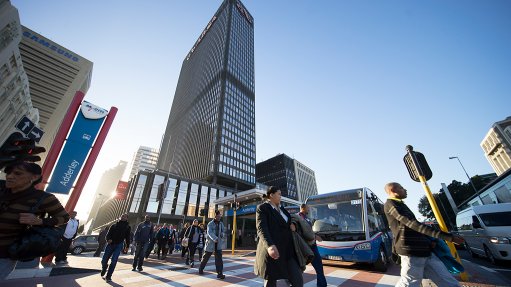
The City of Cape Town should have battery electric buses (e-buses) operational on its MyCiTi bus service by 2027, says Urban Mobility MMC Rob Quintas.
It will be the city’s second stab at rolling out the zero-emission technology, following an unsuccessful attempt as an early adopter in 2018.
E-buses has since experienced significant progress in terms of range and technology.
Quintas tells Engineering News Online that the Cape Town council has given the Urban Mobility Directorate the go-ahead to proceed with adopting alternate energy buses as part of MyCiTi Phase 2A.
Phase 2A will expand the bus service to run between Mitchells Plain, Khayelitsha, Wynberg and Claremont.
“At this point in time it is foreseen that the first routes will be operational by mid-2027, if all goes as planned,” says Quintas.
However, the service will not only use e-buses.
Cape Town’s Climate Change Action Plan commits the city to transition to electric or alternative-fuel-powered freight, bus, taxi and passenger vehicles by 2050, explains Quintas.
In terms of this plan, the city’s Urban Mobility Directorate is mandated to develop a procurement strategy for low-carbon-emission vehicles and fuel technologies in pursuit of carbon neutrality.
This initiative also aligns with the national Department of Transport’s Green Transport Strategy (2018 – 2050), which states that 10% of municipal bus fleets must use clean energy within the next 10 to 20 years.
“As such, the directorate has initiated a procurement strategy aimed at zero-emission vehicle solutions for the city’s bus fleet,” notes Quintas.
“The first step was to identify the most suitable alternative or green-vehicle and fuel-technology options for the MyCiTi bus service, supported by the necessary infrastructure.
“The directorate conducted a feasibility study of alternative-energy vehicles, including compressed natural gas, hydrogen electric, battery electric, hybrid and Euro VI [cleaner internal combustion engine] buses.
“Key recommendations from this study advocate for the adoption of a dual strategy, involving the acquisition of both Euro VI diesel buses and battery electric buses for the upcoming procurement cycle for the roll-out of the second phase of the MyCiTi bus service,” says Quintas.
Quintas emphasises that the city will continue to investigate alternative fuel options given the continuous technology changes within the zero- and low-emissions transport industry.
“These need to be monitored to ensure the city procures the best available technology at the time of procurement.”